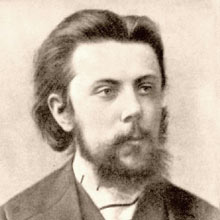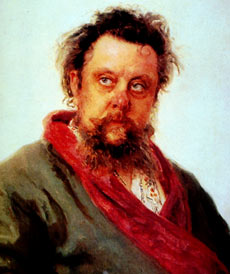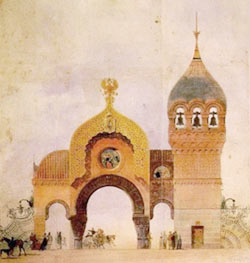Modest Mussorgsky Biography
Most Tragic of Russian Composers
Modest Mussorgsky had one of the most tragic lives of any composer on this site. A hugely promising talent, he descended into a dark spiral of alcohol and poverty before dying relatively young.
His life collapsed due to bad luck and his own self-destructive behavior. But his strong, raw, and ultimately moving music lives on!
Mussorgsky Biography

Modest Mussorgsky was born in 1839, in the Russian countryside, to a wealthy family.
Growing up, he heard the peasants on the family estate singing folk songs. This inspired his fascination with the rougher, more uncouth side of Russian life.
It's really what separated Mussorgsky from all the other Russian composers of the time!
He was a hugely talented pianist as a child, but got carted off to a Cadet Academy at 13 (a family tradition). He composed his first piece while at school, a youthful little polka.
At 18 he joined the real military and got posted in an elite regiment, but left two years later after a nervous breakdown.
His family estate was struck by bad fortune soon after. They ended up losing all their farming serfs. Mussorgsky was forced to find work to support himself, and ended up working for the government in menial office job.
With a growing talent for composing, he became part of the group of Russian composers known as The Five. But he never managed to make a living from his music. He shared a flat with Rimsky-Korsakov for a while, and composed well in the musical environment.
After his mother died in 1865, Modest Mussorgsky turned to alcohol. It was a terrible addiction, but also a way for a young intellectual like him to rebel against the system. He spent his nights in seedy taverns, drowning his future in hard liquor. His decline was slow but steady.
Alcoholics who lived in the 19th century or earlier were unfortunate in the sense that there were practically no alcohol rehab centers (SPONSORED LINK) during their time that could have helped them conquer the disease.
After starting and stopping various opera projects, Mussorgsky finally finished Boris Godunov. He submitted it to the Mariinsky theater, who rejected it. So Mussorgsky edited the opera a fair amount, making it darker and more folk-like.
Eventually premiered in 1874 (5 years after he finished the first version), it was a public hit, and put Mussorgsky on Russia's musical map.
But it wasn't enough! His drinking and depression stopped him from making the most of his success, and interfered hugely with his composing. His fame never really spread which forced him to stay stuck in his job. He also battled with epilepsy on and off.

His alcoholism grew worse towards the end of his life, spurred on by the death of several close friends and the growing apart of the Mighty Five.
The government fired him twice. He would disappear for weeks on drinking binges, and then turn up raving drunk on his friends' doorsteps asking for a bed.
He ended up in a hospital institution. He appeared to get better for a little while, but everyone's hopes were dashed when he lapsed even further.
One of the most shocking and touching anecdotes from this late period is that Mussorgsky, wild-eyed, declared to a friend "there is nothing left but begging", and then collapsed and had four seizures in a row.
The last portrait of the composer, painted a few days before his death, shows an unfocused, red-nosed, broken man.
He died at age 42, a tragic loss for music.
Music

Modest Mussorgsky's music is uniquely Russian. But it's the Russia of wretched peasants, folk tunes, and unearthly legends. He wanted his music to express the "Russian soul", and be written in a Russian style.
So his music is appropriately raw and crude-sounding, influenced by peasant dances and bleak winters.
Still, its beauty and genius is impossible to deny. Mussorgsky never even had proper music training - he learned how to compose by just going at it!
He also rejected the traditional Western European musical structures, instead using whichever form for the music fitted what he wanted to express.
His music didn't become famous until a couple of years after he died, since he left a lot of his greatest work unfinished.
Nikolai Rimsky-Korsakov polished Mussorgsky's pieces up to 'performance standard', eliminating what he saw as his mistakes. He then published them, boosting Mussorgsky's fame.
Read a biography of Nikolai Rimsky-Korsakov.
Although loads of people, including me, now prefer Mussorgsky's forcefully bare originals!
Mussorgksy's songs are really the true core of his output. They have an intimate power and a kind of unique sadness. There's a powerful complete 5-CD set of them all sung by Boris Christoff which I highly recommend.
Modest Mussorgsky's most famous pieces are...
- Boris Godunov, the famous opera. It's the story of a Russian tsar. It's considered the grand jewel of Russian opera, and Mussorgsky's masterpiece.
- A Night on Bald Mountain. A blistering orchestral piece, with a terror-inducing otherwordliness. It depicts an evil witches' ceremony on a bleak mountaintop, conjuring up the devil.
- Pictures at an Exhibition, a delightful suite of piano pieces depicting a walk through a gallery (later lushly orchestrated by Maurice Ravel)
- The song suites Songs and Dances of Death (for orchestra and voice) and Sunless (piano and voice). These are disturbingly bleak songs, reflecting Mussorgsky's inner world of depression.
Here are some Mussorgsky videos for your enjoyment...
On the River, the last piece from the song cycle Sunless. A moody and absorbing piece, it shows Mussorgsky's sublimely introspective side.
Here's an incredible transcription for solo piano by Vladimir Horowitz:
And of course, to show Mussorgsky as he's best know, the terrifying Night on Bald Mountain! Here's Rimsky-Korsakov's re-arrangement...
Return from Modest Mussorgsky to Russian Composers
Return from Modest Mussorgsky to Favorite Classical Composers
If you like my site, please click "Like"... thanks!


